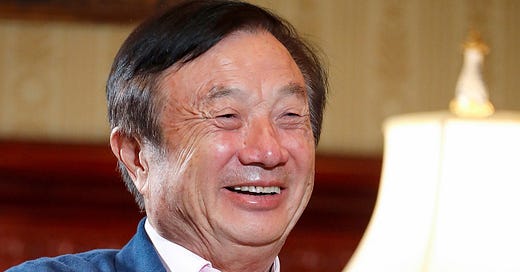Ren Zhengfei: Huawei Still Struggling for Survival, Innovating Out of Necessity
At the International Collegiate Programming Contest (ICPC) gathering, Huawei's chairman, Ren Zhengfei, said the Chinese technology conglomerate is still struggling to survive under the U.S. sanction.
Ren admitted Huawei's current predicament candidly: “To this day, we still can’t say we’ll survive.” The sanctions, however, have pushed Huawei to innovate out of necessity.
During the first three quarters of 2024, Huawei recorded sales revenue of CNY585.9 billion, with a net profit attributable to the parent company CNY62.9 billion. This marks a 28.3% increase in revenue compared to CNY456.6 billion during the same period last year, but a 13.8% decline in net profit from CNY73 billion.
Huawei did not disclose detailed breakdowns for these figures, nor were the data published on its official website. According to the report, the company's revenue for the third quarter was CNY168.4 billion, accompanied by a net profit of CNY7.758 billion. While revenue showed year-over-year growth, net profit fell.
Ren spoke about the challenges, “Due to the sanction, Huawei has to innovate. I started my own business, not as everyone imagines—with ideals—but to survive, to have food. At that time, we were compelled by life, with no regrets, no retreat, only to move forward. I cannot talk about having any dreams at that time.”
He observed that 99% of Chinese companies operate without U.S. sanctions and can access more advanced chips and technology than Huawei. Yet, under such circumstances, he posed a sobering question, “Can we sustain ourselves in the coming years?” Ren reminded the audience that the company is in a state of continued struggle. While public perceptions of Huawei may paint a picture of ambition and resilience, Ren noted that internally, the conversations focus on navigating difficulties and finding ways to overcome significant obstacles.
This raw honesty served as a reminder of the uncertain path ahead for Huawei, underlining that even in a climate of perseverance, the future remains fraught with challenges.
In the Q&A sessions with ICPC participants, Ren shared candid reflections on the realities of engineering and technology, emphasizing the competitive nature of proprietary knowledge. He illustrated this with an example: German manufacturers closely guard their high-speed railroad brake pad technology, to the extent that China must send old brake pads to Germany to receive new replacements.
Ren highlighted the United States as a global model of scientific and technological advancement, attributing its progress over the past two centuries to a spirit of openness and inclusiveness. He pointed out that this openness has allowed talent from around the world to contribute to U.S. innovation, fostering cultural, social, and technological diversity. According to Ren, this inclusive approach has been fundamental to the country’s transformation from a relatively undeveloped state to a global leader in innovation. He stressed that the U.S. has set a standard for other nations and companies, emphasizing that closing off from global collaboration leads to stagnation.
Ren affirmed that Huawei aims to learn from the American model of openness. He acknowledged that while Huawei has faced significant U.S. sanctions, the majority of Chinese companies have not. Most Chinese firms continue to leverage U.S. technology, which Ren described as superior. He underscored that open innovation—drawing on global advancements—remains the cornerstone of corporate growth and resilience.



